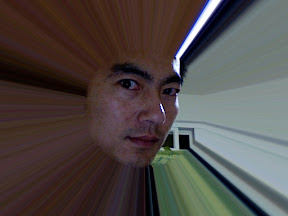Monday, March 19, 2007
The Economist article about Taiwan.... (lost, quite deliberately, in translation)
原文:蔣介石留給後人的東西,「從未被適當的檢查過」
====> 蔣的歷史功過,在台灣並沒有給予應有的檢驗.
原文:民進黨或許基於選舉考量,但關鍵是民進黨將二二八事件塑造為
==> 或許這是民進黨在選舉前的政治操作,但是操不操作還是其次
But they fear that Taiwan, by breaking with Chiang's legacy, may also be breaking away from the Chinese mainland.
這裏用 breaking with....... breaking away from...... (英文看起來,比較有對仗美)
caption: "no longer mourned" (這也沒翻, "沒有人在哀悼它", 這是雙關語, 可以指哀悼蔣銅像的移除,或對他本人的哀悼)
title: "Cultural revolution" (這也是雙關語, 有人會覺得這是像中國的文化大革命,也有人會覺得這是台灣自己在從事心理上的
====================
說到標題, The Economist 最會用半開玩笑的口氣, 三週前, 有一篇about "chinese consumption", 叫"會有奇蹟出現嗎"(Can pigs fly?),會不會有人看作是中國是豬?
Chinese consumption (http://www.economist.com/finance/displaystory.cfm?story_id=E1_RSQGPJP)
Can pigs fly?
Feb 22nd 2007 | HONG KONG
From The Economist print edition
China's households are not as tight-fisted as you think
==========================="打破了蔣介石的遺跡", what is this? 誰要賠....呵...
==============================
http://www.libertytimes.com.tw/2007/new/mar/19/today-p1.htm
經濟學人去蔣化報導 統派媒體硬拗為文革
 |
| 經濟學人雜誌報導台灣打算拆除中正紀念堂圍牆的新聞,以 |
〔記 者王平宇/台北報導〕「經濟學人」雜誌以「文化革命」
副標「獨裁者遺產的戰爭」
還原這篇報導,其副標題訂為「獨裁者遺產的戰爭」(The fight over a dictator's legacy)。文中多次將蔣介石與獨裁者作直接連結
文章一開始提到,一九四九年蔣介石被毛澤東打敗後
蔣遺世事物未被適當檢查
報導更提到,蔣介石留給後人的東西,「從未被適當的檢查過」
有趣的是,報導提到陳水扁與執政民進黨具有台獨傾向
報導提到,為將屠殺責任歸咎蔣介石與國民黨「外來政權」
中國擔心打破兩岸關連
報導分析,民進黨或許基於選舉考量,但關鍵是民進黨將二二八事件塑
未與文化大革命相提並論
經濟學人這篇報導堪稱中性不帶預設立場,主旨在向不了解台灣政局的
Taiwan
Cultural revolution
Mar 15th 2007 | TAIPEI
From The Economist print edition
http://www.economist.com/world/asia/displaystory.cfm?story_id=8861553
The fight over a dictator's legacy
CHIANG KAI-SHEK may once have been revered as a near-god on Taiwan, where .............
This has provoked a political row, which this week engulfed Taiwan's defence minister, Lee Jye. He was expelled from the Kuomintang (KMT), Chiang's former ruling party, for allowing statues of the old nationalist to be removed from Taiwan's military bases.
Chiang's legacy has never been properly examined in Taiwan. Arguments about the past are also fights over what the island should be in the future: a part of China (the view of Chiang Kai-shek and his political heirs), or an independent nation with a distinct, non-Chinese Taiwanese identity.
The current government of President Chen Shui-bian, whose Democratic Progressive Party (DPP) leans towards independence (but which appointed a KMT man as defence minister), intensified its campaign against the generalissimo as the island marked the 60th anniversary of the "228 Incident"—the KMT's violent suppression of protests against its rule on February 28th 1947. An estimated 28,000 were killed.
Blaming the massacres on Chiang and the "outside" regime of the KMT, the DPP announced plans to rename the giant Chiang Kai-shek Memorial Hall in Taipei as the "Taiwan Democracy Memorial Hall", and tear down the sanctuary's perimeter wall. The central government dropped "China" from the names of many state enterprises last month. There is talk of removing Chiang's portrait from Taiwanese coins.
DPP leaders may be politicking ahead of parliamentary elections in December, and presidential polls next March. But there is more at stake. By casting the 228 Incident as a clash between Taiwanese and KMT "outsiders", the DPP has not only opened old wounds in Taiwan but also created anxiety in Beijing. China's Communists may have been at odds with the generalissimo. But they fear that Taiwan, by breaking with Chiang's legacy, may also be breaking away from the Chinese mainland.
 No longer mourned
No longer mourned

